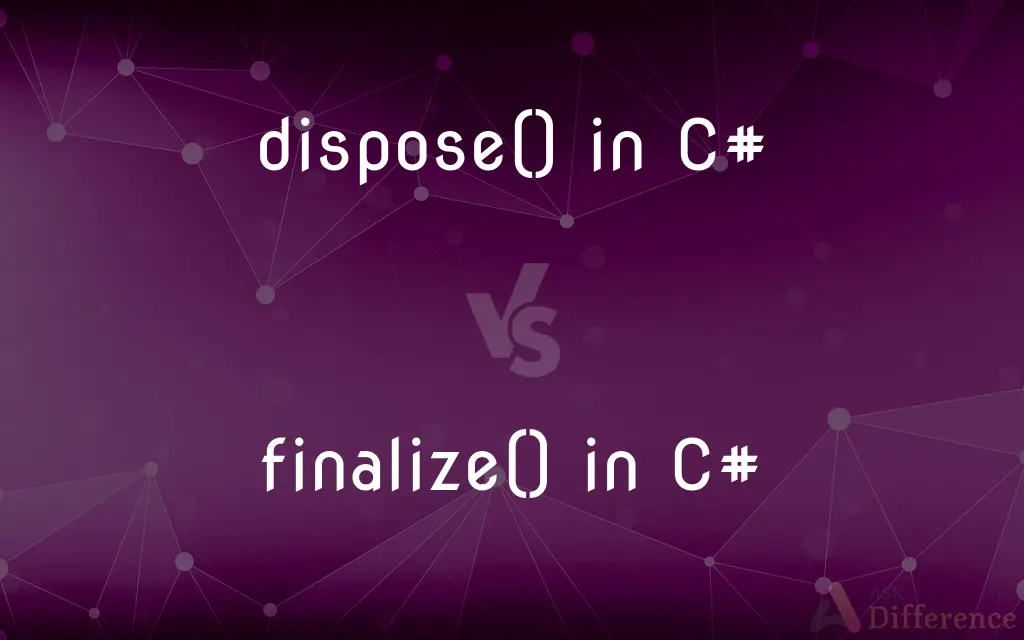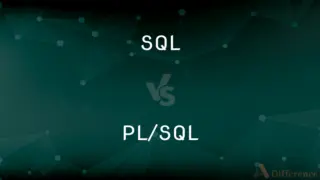dispose() in C# vs. finalize() in C# — What's the Difference?
By Tayyaba Rehman — Published on January 9, 2024
dispose() in C# is for explicit resource management, finalize() is for implicit cleanup during garbage collection.

Difference Between dispose() in C# and finalize() in C#
Table of Contents
ADVERTISEMENT
Key Differences
dispose() in C# is a method that is explicitly called to free unmanaged resources such as file handles and database connections. It is part of the IDisposable interface, which provides a mechanism for releasing unmanaged resources deterministically. In contrast, finalize() is used by the garbage collector to reclaim unmanaged resources that have not been explicitly released by calling dispose().
dispose() is deterministic, meaning the developer knows exactly when the resources are released, which is when the method is called. finalize() on the other hand, is non-deterministic, as you cannot predict when the garbage collector will call it. finalize() is called during the garbage collection process, which is managed by the CLR (Common Language Runtime).
Implementing dispose() requires the class to implement the IDisposable interface. It provides the Dispose method which must be called explicitly, usually within a using statement that ensures that Dispose is called even if an exception occurs. finalize() is a protected method that is overridden from the Object class and is implicitly called by the garbage collector.
dispose() is intended to be called by user code, which can lead to more efficient resource management and better performance. finalize() is usually only called by the runtime as a safety net to clean up resources if dispose() was not called. Overuse of finalize() can result in performance overhead due to the additional work for the garbage collector.
A class with a finalize() method incurs some additional overhead during garbage collection, as the object must be placed in a finalization queue before it can be collected. The use of dispose(), however, is encouraged to free up resources as soon as they are no longer needed, without waiting for the garbage collector, thus improving the performance of the application.
ADVERTISEMENT
Comparison Chart
Invocation
Explicitly called by the user code.
Implicitly called by the garbage collector.
Determinism
Deterministic, as it's controlled by the programmer.
Non-deterministic, as it depends on the garbage collector.
Part of Interface
Part of the IDisposable interface.
No interface; override from the Object class.
Resource Management
Allows for immediate cleanup of resources.
Resources are cleaned up eventually, not immediately.
Control Over Cleanup Process
Programmer has control over when resources are released.
The garbage collector controls when resources are released.
Performance
Can improve performance by timely resource release.
Can potentially decrease performance due to finalization overhead.
Compare with Definitions
dispose() in C#
Immediately frees unmanaged resources.
Stream.Dispose();
finalize() in C#
No guaranteed time for invocation by the runtime.
/* finalize() is called unpredictably */
dispose() in C#
Must be implemented for classes using unmanaged resources.
Public void Dispose() { /* Cleanup code here */ }
finalize() in C#
Acts as a backup to free resources if dispose() is not called.
/* finalize() may release resources if not already done */
dispose() in C#
Invoked by the programmer to dispose of resources.
MyResource.Dispose();
finalize() in C#
Must override the Finalize method from the Object class.
Protected override void Finalize() { try { /* Cleanup */ } finally { base.Finalize(); } }
dispose() in C#
Often enclosed in a using statement for automatic disposal.
Using (var resource = new Resource()) { /* Use resource */ }
finalize() in C#
Synonymous with the destructor in C#.
Protected override void Finalize() { /* Cleanup */ }
dispose() in C#
Ensures predictable release of resources.
FileWriter.Dispose();
finalize() in C#
Called by garbage collector before object is reclaimed.
~MyResource() { /* Finalize code here */ }
Common Curiosities
Can finalize() be called directly?
No, finalize() is protected and can only be called by the garbage collector.
Should I implement both dispose() and finalize()?
Implement dispose() to allow deterministic cleanup and finalize() as a safety net.
When should dispose() be used in C#?
Use dispose() when you need to explicitly release unmanaged resources in a deterministic manner.
What is the purpose of finalize() in C#?
finalize() is used to release unmanaged resources if an object is being collected by the garbage collector and dispose() has not been called.
What is the Dispose pattern?
It's a convention in C# that combines dispose() with finalize() to ensure all resources are released properly.
Can dispose() throw an exception?
Yes, dispose() can throw exceptions, which should be handled appropriately.
Are there any alternatives to using finalize()?
Yes, the SafeHandle class provides a robust way to handle unmanaged resources without requiring a finalize() method.
How do I force a finalize() call?
You cannot force it; finalize() is only called by the garbage collector.
Is dispose() automatically called by the garbage collector?
No, dispose() must be explicitly called by the programmer or via a using statement.
When is finalize() called in the object's lifecycle?
finalize() is called just before the garbage collector reclaims the object's memory.
Is it necessary to call dispose() on a managed object?
No, managed resources are handled by the garbage collector and do not require dispose().
Does overriding finalize() affect performance?
Yes, it can introduce overhead since objects with a finalize() method take longer to be collected.
What happens if I forget to call dispose()?
Resources may not be released promptly, leading to memory leaks or resource exhaustion.
Can I suppress finalize() if I’ve already called dispose()?
Yes, you can suppress finalization by calling GC.SuppressFinalize(this) in the dispose() method.
How does the using statement relate to dispose()?
The using statement ensures dispose() is called automatically, even if an exception occurs.
Share Your Discovery

Previous Comparison
SQL vs. PL/SQL
Next Comparison
Systematic Risk vs. Unsystematic RiskAuthor Spotlight
Written by
Tayyaba RehmanTayyaba Rehman is a distinguished writer, currently serving as a primary contributor to askdifference.com. As a researcher in semantics and etymology, Tayyaba's passion for the complexity of languages and their distinctions has found a perfect home on the platform. Tayyaba delves into the intricacies of language, distinguishing between commonly confused words and phrases, thereby providing clarity for readers worldwide.














































